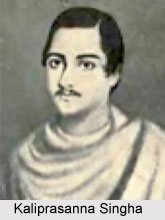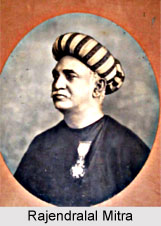 Kaliprasanna Singha (1840-1870) is the celebrated author of Hutom Pyanchar Naksha (1862) whose name stands very high amidst the makers of Bengali literature.
Calcutta often becomes a bespectacled spectator as we erase imprints, phases of our cultural past ness of the past from the countenance of the city. The home of Kaliprasanna Singha (1840-70) in Baranasi Ghosh Street refers to one such example of old Kolkata.
Kaliprasanna Singha (1840-1870) is the celebrated author of Hutom Pyanchar Naksha (1862) whose name stands very high amidst the makers of Bengali literature.
Calcutta often becomes a bespectacled spectator as we erase imprints, phases of our cultural past ness of the past from the countenance of the city. The home of Kaliprasanna Singha (1840-70) in Baranasi Ghosh Street refers to one such example of old Kolkata.
It was a series of sketches describing social life in contemporary Calcutta. It exposes the extravagance and immorality of the new-rich Bengali babu. He has a good command of the colloquial tongue. He was less concerned with form and style to be a good writer. He was fond of crude caricature and low buffoonery to be a good satirist. Hutom Pyanchar Naksha has vivid and striking passages though it is a brilliant lampoon in a folksy style enumerating Kolkata dialect.
Early Life of Kaliprasanna Singha
He was born in 1840 in the renowned "Singha" family in North Kolkata. His family was rich and famous. From his early life only he had been devoted student of English, his knowledge of both Sanskrit and English above the limitations of the ordinary.
 One of the contemporaries of Iswar Chandra Vidyasagar, were Rajendralal Mitra and Kaliprasanna Singha, both prominent in their time with the contemporary Bengalis, actively engaged in social development, including the advancement of literature. Kaliprassana reviewed Meghnadvadh Kabya.
One of the contemporaries of Iswar Chandra Vidyasagar, were Rajendralal Mitra and Kaliprasanna Singha, both prominent in their time with the contemporary Bengalis, actively engaged in social development, including the advancement of literature. Kaliprassana reviewed Meghnadvadh Kabya.
He died at the early age of thirty though he did a lot for the promotion of his native literature and culture. He edited several periodicals, the best was the Vidyotsdhini. He was the first to recognize the genius of Michael Madhusudan Dutta and honoured the poet in a public meeting. One of his greatest services to his mother tongue was the prose translation of the Mahabharata.
Career Of Kaliprassan Singha
He was a multi faceted personality as he was an author, editor, a publisher, a philanthropist, a social worker, and a great patron of art, literature and culture. He edited or published several magazines like Vidyotsahini Patrika, Paridarshak, Sarvatattwa Prakashika, Bibidhartha Samgraha.
He plays include "Vikramorvashi", "SabitriSatyaban", "MalatiMadhav" and "Babu". He advocated widow remarriage. Kaliprasanna was appointed as an Honorary Magistrate and Justice of Peace. He has also served as the Chief Presidency Magistrate of Calcutta for sometime.
This article is a stub. You can enrich by adding more information to it. Send your Write Up to content@indianetzone.com



















